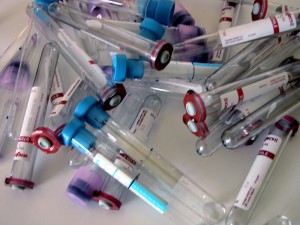What is pernicious anemia, and how is it different from vitamin B12 deficiency or megaloblastic anemia? That is one of many questions that people have about pernicious anemia- questions that are answered here.

 1. What’s the difference between pernicious anemia and megaloblastic anemia?
1. What’s the difference between pernicious anemia and megaloblastic anemia?
Pernicious anemia, a form of megaloblastic anemia, is a disease that impairs red blood cell distribution through vitamin B12 deficiency; for that reason, it is also called vitamin B12 malabsorption anemia.
(It is worth mentioning that pernicious anemia is only one of many factors that causes vitamin B12 deficiency.)
Other names for pernicious anemia are Biermer’s anemia, Addison’s anemia, and combined systems disease (a disorder of the nervous system).
 2. What is the relationship between intrinsic factor and pernicious anemia?
2. What is the relationship between intrinsic factor and pernicious anemia?
Whenever you eat foods that contain vitamin B12- protein foods like beef, chicken, seafood, cheese, and eggs- your digestive system produces a chemical called intrinsic factor, a digestive enzyme.
Intrinsic factor then grabs the vitamin B12 from your stomach, bonds to it, carries it through the small intestine, and delivers it to the ileum, at the base of your small intestine.
From here, the vitamin B12 is then either absorbed and dispersed into your bloodstream as “active vitamin B12,” or it is stored in the liver. That is how most people digest vitamin B12.
People who suffer from pernicious anemia are not able to manufacture or regulate the intrinsic factor enzyme. Even if they eat plenty of foods rich in vitamin B12, they are unable to digest the essential vitamin, and the result is a catastrophic depletion of vitamin B12 levels in the blood.
 3. What are the symptoms of B12 deficiency- pernicious anemia?
3. What are the symptoms of B12 deficiency- pernicious anemia?
The most common pernicious anemia symptoms are:
- Extreme fatigue
- Depression
- Trouble concentrating
- Memory loss
- Irritability
- Painful tingling sensations in hands and feet
- Hands and feet often “falling asleep” or going numb
- Sore, red tongue
- Altered taste perception
- Constant stumbling while walking
- Clumsiness
- Muscular feebleness
- Pale complexion
- Diarrhea
- Stomach pains
- Trouble sleeping
Untreated, vitamin B12 deficiency causes low red blood cell production, forgetfulness, severe nerve damage, and increased risk for heart attack , stroke, and osteoporosis.
 4. What natural remedies work best for pernicious anemia?
4. What natural remedies work best for pernicious anemia?
Since pernicious anemia results from vitamin B12 deficiency, the only remedy you need is…more B12! The real question is: How much vitamin B12 do you need? Only your doctor can answer that by taking blood tests, determining if your body makes intrinsic factor, and prescribing the proper venue of vitamin B12 supplementation.
If it is determined that you lack intrinsic factor, then you will need to take vitamin B12 supplements, most likely for the rest of your life, in order to avoid getting vitamin B12 deficiency again.
 5. Why is a pernicious anemia patient unable to take vitamin B12 orally?
5. Why is a pernicious anemia patient unable to take vitamin B12 orally?
Without intrinsic factor, your body cannot digest dietary sources of vitamin B12- and that includes vitamin B12 pills. As a rule of thumb, if vitamin B12 passes through a digestive system that does not produce intrinsic factor, then the B12 will pass through without being broken down or digested. In order to get vitamin B12 into your blood supply, you have to insert it there directly- usually through B12 shots.
 6. How long does it take before you start to feel the benefits of vitamin B12 supplements?
6. How long does it take before you start to feel the benefits of vitamin B12 supplements?
Assuming you are getting the correct dose of vitamin B12, and are taking an efficient method of B12 supplements…most patients start to feel notably better within 24 hours of vitamin B12 supplementation.
 7. Is Pernicious anemia genetic?
7. Is Pernicious anemia genetic?
Family history is one of many causes of pernicious anemia. If your family has a history of suffering from pernicious anemia, then you should take routine blood tests for vitamin B12 deficiency throughout your life.

What are the Symptoms of Pernicious Anemia- B12 deficiency?
 8. If I have one autoimmune disease like pernicious anemia, am I more likely to have another autoimmune disease?
8. If I have one autoimmune disease like pernicious anemia, am I more likely to have another autoimmune disease?
Scientists have noted a high correlation between pernicious anemia and many other autoimmune disorders. When other diseases are a factor, pernicious anemia often occurs from drug interactions, comorbid symptoms, or a cyclical relationship with that disease. Below are some conditions that may accompany pernicious anemia:
- Fibromyalgia
- Chronic fatigue
- Crohn’s disease
- Ulcerative colitis
- Diabetes
- Leaky Gut Syndrome
- Celiac disease
- Gastritis
- Chronic heartburn
- Hypothyroidism
Leaky Gut Syndrome Symptoms and Causes
 9. I’m only 20 years old. Could someone my age have pernicious anemia?
9. I’m only 20 years old. Could someone my age have pernicious anemia?
Pernicious anemia can happen to somebody of any age group. Because your body stores vitamin B12 in the liver for several years, you may not know that your body has stopped absorbing it until you start to feel the symptoms, by which time your B12 levels will have dropped severely. If you suspect you have any of the symptoms of pernicious anemia, then do not hesitate to get a blood test.
 10. Can pernicious anemia cause gastritis?
10. Can pernicious anemia cause gastritis?
Gastritis– painful inflammation of the stomach lining- has many possible causes. The most common are alcohol abuse, chronic vomiting, and overusing drugs such as aspirin. Untreated, chronic gastritis can cause blood loss. Other causes of gastritis are:
- Pernicious anemia
- Stomach infection
- Bile reflux
- Viruses
 11. Can pernicious anemia shorten your life?
11. Can pernicious anemia shorten your life?
When scientists first discovered vitamin B12 deficiency anemia, they deemed it a fatal disease, and thus named it “pernicious (malicious) anemia.” Without B12, your body is unable to make sufficiency red blood cells. Today, doctors are easily able to diagnose vitamin B12 deficiency through blood tests, administer treatment in the form of pure vitamin B12, and prevent further escalation of pernicious anemia. Untreated, pernicious anemia can lead to life-threatening illnesses, such as heart attack, stroke.
 12. Can pernicious anemia cause stomach damage?
12. Can pernicious anemia cause stomach damage?
Pernicious anemia may cause gastric polyps, increasing one’s risk for getting stomach damage or gastric carcinoid tumors.
 13. Are there any support groups for others with pernicious anemia?
13. Are there any support groups for others with pernicious anemia?
There are many advocacy groups for pernicious anemia, and most of them are on Facebook. Here are a few:
Pernicious Anaemia Society
Vitamin B12 Deficiency on Facebook
Pernicious Anemia Awareness on Facebook
Pernicious Anaemia – What do you know?…And what they don’t tell you! on Facebook
Read more about pernicious anemia and vitamin B12:
Painful Tingling in Hands and Feet- What’s Up with That?
Lupus and Vitamin B12 Deficiency- What’s the Connection?
Babies, B12, and Fertility- B12 Deficiency during Pregnancy
Sources:
Vitamin B12 (cobalamin)- University of Maryland Medical Center
Gastritis: Symptoms, Causes, Treatments, and More
Pernicious Anemia- Medscape
Pernicious Anemia Symptoms, Causes, Diagnosis, Treatment, and Prevention on MedicineNet.com
Image credits, from top:
Danilo Rizzuti, digitalart, Salvatore Vuono
























